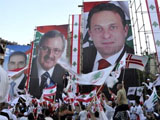Al-Hariri Faces Uphill Task
By Dominic Moran for ISN
Reappointed Lebanese prime minister-designate Saad al-Hariri faces major challenges, well beyond the weeks of bickering that lie ahead in what have already been grinding cabinet negotiations.
It would appear that the primary hurdle for al-Hariri and his anti-Syrian March 14 coalition, in the necessary formation of a national unity government, remains the division of cabinet seats and identities of individual ministers, though the influence of wider national and regional interests should not be discounted.
A particular sticking point is the insistence of Michel Aoun's Free Patriotic Movement (FPM) that Aoun's son-in-law, Jebran Bassil, retain the Telecommunications Ministry in the new cabinet lineup.
The violent civil conflict of May 2008 was triggered, in part, by the then-March 14 government's move to shut down Hizbollah's independent telecommunications network. Hizbollah and the FPM are allies within the wider pro-Syrian March 8 opposition coalition.
Al-Hariri is reportedly strongly opposed to Bassil's reappointment and wants to rotate ministries between coalition parties.
Nevertheless, it is likely that the new cabinet will be formed on the basis of a 15-10-5 split, in which March 8 holds 10 portfolios, 15 go to March 14 parties, and the remaining five to presidential nominees.
This division would give President Michel Suleiman's appointees the deciding vote on controversial measures and is designed to prevent political stalemate.
The May 2008 conflict, and resultant Doha Accord, irrevocably drew a line under March 14 efforts to move away from the traditional consociational model of the Lebanese political system, despite recent posturing to the contrary.
Thus, the March 14 victory in the June elections was largely, but not entirely, symbolic. It confirmed the formation of a new government under the leadership of the anti-Syrian bloc, without their enjoying any real authority on contentious policy issues.
The subsequent decision by Walid Jumblatt to move his Progressive Socialists away from March 14, toward a more intermediate centrist position, is a sign that the artificial ossification of two fundamentally opposed political camps - totally alien to the traditionally shifting allegiances and alliances of Lebanese politics - could be starting to fragment.
In June, Suleiman did not receive the support of the electorate for the formation of a centrist bloc under his authority or guidance, but appears poised to achieve through the cabinet formation process what was denied him at the ballot box.
Whether there is ultimately any basis for the establishment of a political center between the still diametrically opposed interests of major March 8 and March 14 parties remains in serious doubt, and will be strongly influenced by the playing out of tensions in the oft-fraught Saudi-Syrian relationship.
Ultimately, it is to be hoped that al-Hariri will succeed in bringing a modus vivendi to the fractious and fractured Lebanese political scene, but, given his own intimate association with the conflicts of the post-Syrian occupation period, the chances appear slim at best.

